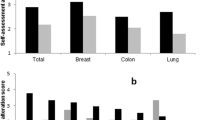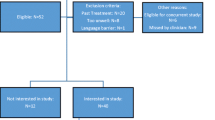Abstract
Purpose
To investigate how outpatient-based chemotherapy would alter the senses of taste and smell and affect daily dietary intake in patients with lung cancer.
Methods
The self-reported taste and smell alteration (TSA) in 35 Japanese patients with lung cancer as well as their patterns of dietary intake at home were tested using a questionnaire.
Results
The patients experienced considerable TSA, and smoking was shown to contribute to this alteration. Specifically, current or past smokers were more likely to experience subjective taste change during chemotherapy than never smokers were. Chemotherapy made steamed rice or sushi the most unfavorable food in the patients; on the other hand, Japanese-style noodles were the most preferred during chemotherapy. Nevertheless, the patients maintained their habit of consuming steamed rice at home at least once a day, suggesting the robustness of dietary habits despite the TSA caused by chemotherapy.
Conclusions
Nutritional assessment as well as appropriate advice and intervention by dietitians is expected to improve the general conditions and quality of daily living in patients with cancer.





Similar content being viewed by others
References
Ministry of Health Labour and Welfare (2017) Vital Statistics. https://www.mhlw.go.jp/index.html
Center for Cancer Control and information services, National Cancer Center Japan: https://www.ncc.go.jp/en/cis/index.html
Yu JL, Simmons C, Victor JC, Han D, Hogeveen S, Leighl N, Verma S (2011) Impact of new chemotherapeutic and targeted agents on survival in stage IV non-small cell lung cancer. Oncologist 16:1307–1315
Wakelee H, Kelly K, Edelman MJ (2014) 50 years of progress in the systemic therapy of non-small cell lung cancer. Am Soc Clin Oncol Educ Book 34:177–189
Boltong A, Keast R (2012) The influence of chemotherapy on taste perception and food hedonics: a systematic review. Cancer Treat Rev 38:152–163
Coa KI, Epstein JB, Ettinger D, Jatoi A, McManus K, Platek ME, Price W, Stewart M, Teknos TN, Moskowitz B (2015) The impact of cancer treatment on the diets and food preferences of patients receiving outpatient treatment. Nutr Cancer 67:339–353
Spotten L, Corish C, Lorton C, Dhuibhir PU, O'Donoghue N, O'Connor B, Cunningham M, El Beltagi N, Gillham C, Walsh D (2016) Subjective taste and smell changes in treatment-naive people with solid tumours. Support Care Cancer 24:3201–3208
Steinbach S, Hummel T, Bohner C, Berktold S, Hundt W, Kriner M, Heinrich P, Sommer H, Hanusch C, Prechtl A, Schmidt B, Bauerfeind I, Seck K, Jacobs VR, Schmalfeldt B, Harbeck N (2009) Qualitative and quantitative assessment of taste and smell changes in patients undergoing chemotherapy for breast cancer or gynecologic malignancies. J Clin Oncol 27:1899–1905
Wickham RS, Rehwaldt M, Kefer C, Shott S, Abbas K, Glynn-Tucker E, Potter C, Blendowski C (1999) Taste changes experienced by patients receiving chemotherapy. Oncol Nurs Forum 26:697–706
Zabernigg A, Gamper EM, Giesinger JM, Rumpold G, Kemmler G, Gattringer K, Sperner-Unterweger B, Holzner B (2010) Taste alterations in cancer patients receiving chemotherapy: a neglected side effect? Oncologist 15:913–920
Boltong A, Aranda S, Keast R, Wynne R, Francis PA, Chirgwin J, Gough K (2014) A prospective cohort study of the effects of adjuvant breast cancer chemotherapy on taste function, food liking, appetite and associated nutritional outcomes. PLoS One 9:e103512
Gamper EM, Zabernigg A, Wintner LM, Giesinger JM, Oberguggenberger A, Kemmler G, Sperner-Unterweger B, Holzner B (2012) Coming to your senses: detecting taste and smell alterations in chemotherapy patients. A systematic review. J Pain Symptom Manag 44:880–895
Murtaza B, Hichami A, Khan AS, Ghiringhelli F, Khan NA (2017) Alteration in taste perception in cancer: causes and strategies of treatment. Front Physiol 8:134
Amezaga J, Alfaro B, Rios Y, Larraioz A, Ugartemendia G, Urruticoechea A, Tueros I (2018) Assessing taste and smell alterations in cancer patients undergoing chemotherapy according to treatment. Support Care Cancer 26:4077–4086
Minakata Y, Yamagata T, Nakanishi H, Nishimoto T, Nakanishi M, Mune M, Yukawa S (2002) Severe gustatory disorder caused by cisplatin and etoposide. Int J Clinical Oncol 7:124–127
Rehwaldt M, Wickham R, Purl S, Tariman J, Blendowski C, Shott S, Lappe M (2009) Self-care strategies to cope with taste changes after chemotherapy. Oncol Nurs Forum 36:E47–E56
Turcott JG, Juarez-Hernandez E, De la Torre-Vallejo M, Sanchez-Lara K, Luvian-Morales J, Arrieta O (2016) Value: changes in the detection and recognition thresholds of three basic tastes in lung cancer patients receiving cisplatin and paclitaxel and its association with nutritional and quality of life parameters. Nutr Cancer 68:241–249
de Vries YC, Helmich E, Karsten MD, Boesveldt S, Winkels RM, van Laarhoven HW (2016) The impact of chemosensory and food-related changes in patients with advanced oesophagogastric cancer treated with capecitabine and oxaliplatin: a qualitative study. Support Care Cancer 24:3119–3126
Spotten LE, Corish CA, Lorton CM, Ui Dhuibhir PM, O'Donoghue NC, O'Connor B, Walsh TD (2017) Subjective and objective taste and smell changes in cancer. Ann Oncol 28:969–984
Inagaki M, Masuko K, Nakajima M, Tomishima Y, Sekiguchi Y, Naito M, Imai T (2015) Effect of outpatient chemotherapy on oral intake in patients with lung cancer. JPEN J Parenter Enteral Nutr 30:820–823
de Araujo IE, Rolls ET, Kringelbach ML, McGlone F, Phillips N (2003) Taste-olfactory convergence, and the representation of the pleasantness of flavour, in the human brain. Eur J Neurosci 18:2059–2068
Schiffman SS, Graham BG (2000) Taste and smell perception affect appetite and immunity in the elderly. Eur J Clin Nutr 54(Suppl 3):S54–S63
McGreevy J, Orrevall Y, Belqaid K, Wismer W, Tishelman C, Bernhardson BM (2014) Characteristics of taste and smell alterations reported by patients after starting treatment for lung cancer. Support Care Cancer 22:2635–2644
Cheruel F, Jarlier M, Sancho-Garnier H (2017) Effect of cigarette smoke on gustatory sensitivity, evaluation of the deficit and of the recovery time-course after smoking cessation. Tob Induc Dis 15:15
Da Re AF, Gurgel LG, Buffon G, Moura WER, Marques Vidor DCG, Maahs MAP (2018) Tobacco influence on taste and smell: systematic review of the literature. Int Arch Otorhinolaryngol 22:81–87
Belqaid K, Orrevall Y, McGreevy J, Mansson-Brahme E, Wismer W, Tishelman C, Bernhardson BM (2014) Self-reported taste and smell alterations in patients under investigation for lung cancer. Acta Oncologica (Stockholm, Sweden) 53:1405–1412
Belqaid K, Tishelman C, McGreevy J, Mansson-Brahme E, Orrevall Y, Wismer W, Bernhardson BM (2016) A longitudinal study of changing characteristics of self-reported taste and smell alterations in patients treated for lung cancer. Eur J Oncol Nurs 21:232–241
Campagna S, Gonella S, Sperlinga R, Giuliano PL, Marchese R, Pedersini R, Berchialla P, Dimonte V (2018) Prevalence, severity, and self-reported characteristics of taste alterations in patients receiving chemotherapy. Oncol Nurs Forum 45:342–353
Schalk P, Kohl M, Herrmann HJ, Schwappacher R, Rimmele ME, Buettner A, Siebler J, Neurath MF, Zopf Y (2018) Influence of cancer and acute inflammatory disease on taste perception: a clinical pilot study. Support Care Cancer 26:843–851
Batisse C, Bonnet G, Eschevins C, Hennequin M, Nicolas E (2017) The influence of oral health on patients’ food perception: a systematic review. J Oral Rehabil 44:996–1003
Ileri-Gurel E, Pehlivanoglu B, Dogan M (2013) Effect of acute stress on taste perception: in relation with baseline anxiety level and body weight. Chemsenses 38:27–34
de Araujo Nobre M, Malo P (2017) Prevalence of periodontitis, dental caries, and peri-implant pathology and their relation with systemic status and smoking habits: results of an open-cohort study with 22009 patients in a private rehabilitation center. J Dent 67:36–42
Sanchez-Lara K, Sosa-Sanchez R, Green-Renner D, Rodriguez C, Laviano A, Motola-Kuba D, Arrieta O (2010) Influence of taste disorders on dietary behaviors in cancer patients under chemotherapy. Nutr J 9:15
de Vries YC, van den Berg M, de Vries JHM, Boesveldt S, de Kruif J, Buist N, Haringhuizen A, Los M, Sommeijer DW, Timmer-Bonte JHN, van Laarhoven HWM, Visser M, Kampman E, Winkels RM (2017) Differences in dietary intake during chemotherapy in breast cancer patients compared to women without cancer. Support Care Cancer 25:2581–2591
de Vries YC, Boesveldt S, Kelfkens CS, Posthuma EE, van den Berg M, de Kruif J, Haringhuizen A, Sommeijer DW, Buist N, Grosfeld S, de Graaf C, van Laarhoven HWM, Kampman E, Winkels RM (2018) Taste and smell perception and quality of life during and after systemic therapy for breast cancer. Breast Cancer Res Treat 170:27–34
Acknowledgments
The authors thank the staff at Tsuchiura Kyodo General Hospital and graduates of the Laboratory of Clinical Medicine, Department of Nutrition, Sagami Women’s University, for their help in collecting data.
Author information
Authors and Affiliations
Corresponding author
Ethics declarations
Conflict of interest
The authors declare no conflicts of interest associated with this manuscript.
Research involving human participants and/or animals
This study was approved by Tsuchiura Kyodo General Hospital, Sagami Women’s University, and the International University of Health and Welfare.
Informed consent
Written informed consent was obtained from each patient at Tsuchiura Kyodo General Hospital.
Additional information
Publisher’s note
Springer Nature remains neutral with regard to jurisdictional claims in published maps and institutional affiliations.
Rights and permissions
About this article
Cite this article
Yoshimoto, N., Inagaki, M., Sekiguchi, Y. et al. Chemotherapy alters subjective senses of taste and smell but not dietary patterns in Japanese lung cancer patients. Support Care Cancer 28, 1667–1674 (2020). https://doi.org/10.1007/s00520-019-04958-z
Received:
Accepted:
Published:
Issue Date:
DOI: https://doi.org/10.1007/s00520-019-04958-z




